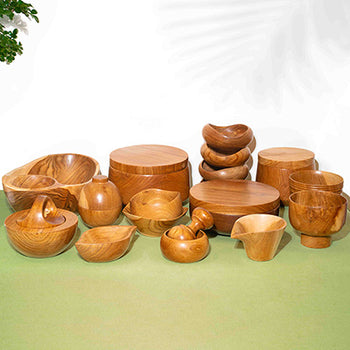Meet our Partner Artisans
Rainforest Bowls values the traditions of woodworking from cultures around the world. In our pursuit to offer the Best of Nature, we partner with artisanal cooperatives from developing regions who have mastered the art of wood making.
Discover where we source our products by clicking on each text below
![]()

Ben Tre, Vietnam
Situated along the Mekong river, Ben Tre is considered as the Coconut Capital of Vietnam. Its nutrient-rich land is home to acres of coconut and acacia trees that are the backbone of the city’s artisanal industry.
The locals uphold the tradition of woodworking and artisanal craft in the region. Using tools and knowledge passed down from generations, they create polished pieces made of coconut shells and acacia wood that are sure to add some tropical sunshine into any home.

Coconut

Coconut Wood

Acacia Wood
Why coconut shells?
Since Ben Tre is home to hundreds of thousands of coconut trees which are harvested for its wood, leaves, coconut water and meat, billions of coconut shells are typically discarded and burned as waste each year. To solve that problem, local communities created a flourishing industry that not only repurposes what used to be trash but also supports the livelihoods of hundreds of families in the area.
How are coconut wood and acacia wood sustainable resources?
Coconut and acacia plantations support a robust artisanal community that creates a steady stream of income not only for the rural communities but also for the national economy.
Coconut plantations in Ben Tre account for roughly 38% of the country’s coconut industry. Because of its significance to the national economy, Ben Tre plantations are highly regulated and maintained by the government and especially the local communities who plant, cultivate, process, and create all-natural goods from these plantations.
Acacia trees are also endemic to Vietnam; the country has around 1.1 million hectares of acacia plantations dedicated to wood production, with 50% of that land being managed by small-scale growers and artisans. Acacia trees take only 5-10 years to reach full maturity, making it a sustainable source for artisanal goods.

Ha Noi, Vietnam
In some cultures, bamboo is considered as the symbol of moral integrity, resilience, and beauty. It’s not difficult to understand why when one sees the graceful growth of bamboo. In Hanoi and Thanh Hoa, Vietnam, bamboo forests and plantations account for 80% of forest coverage in these provinces.
The economic use of bamboo provides steady income from farmers and artisans who create a wide array of bamboo products. Our artisans specialize in making kitchenware pieces that embody the grace and beauty of bamboo and this industry plays an important role in further developing of Hanoi and Thanh Hoa provinces.

Bamboo
How are bamboo trees harvested?
To sustain and protect bamboo plantations, farmers only cut what they need rather than pulling entire trees from its roots. This allows bamboo plantations to maintain forest coverage and a steady supply of raw materials for the many uses of bamboo.

East and Central Java, Indonesia
The high demand for teak wood dates back to earlier centuries. Because of its tight grain and water-resistant properties, teak has been a popular choice for ship builders around the world. This led to teak trees being depleted in countries where it was endemic. But thanks to the commitment of countries like Indonesia to revive, preserve, and repopulate forests with teak, this valuable wood sees a comeback in the furniture and artisanal industry.
To ensure legal and sustainable sourcing, the Indonesian government manages all teak plantations in Indonesia and works with local communities for the planting, harvesting, and processing of teak products. This synergistic collaboration results in high-grade handmade pieces while protecting the livelihoods of locals and the diverse flora and fauna in the country.

Teak Wood
Why is teak so valuable?
Teak is one of the sturdiest hardwoods available in the market. It takes 35-50 years to full maturity, a perfect example of “All Good Things Are Worth the Wait”. Because of the time and care needed to produce high-quality teak, it tends to be more expensive than other hardwoods —but the near-perfect smooth surface, rich grain patterns, and water-resistance properties are worth the investment.
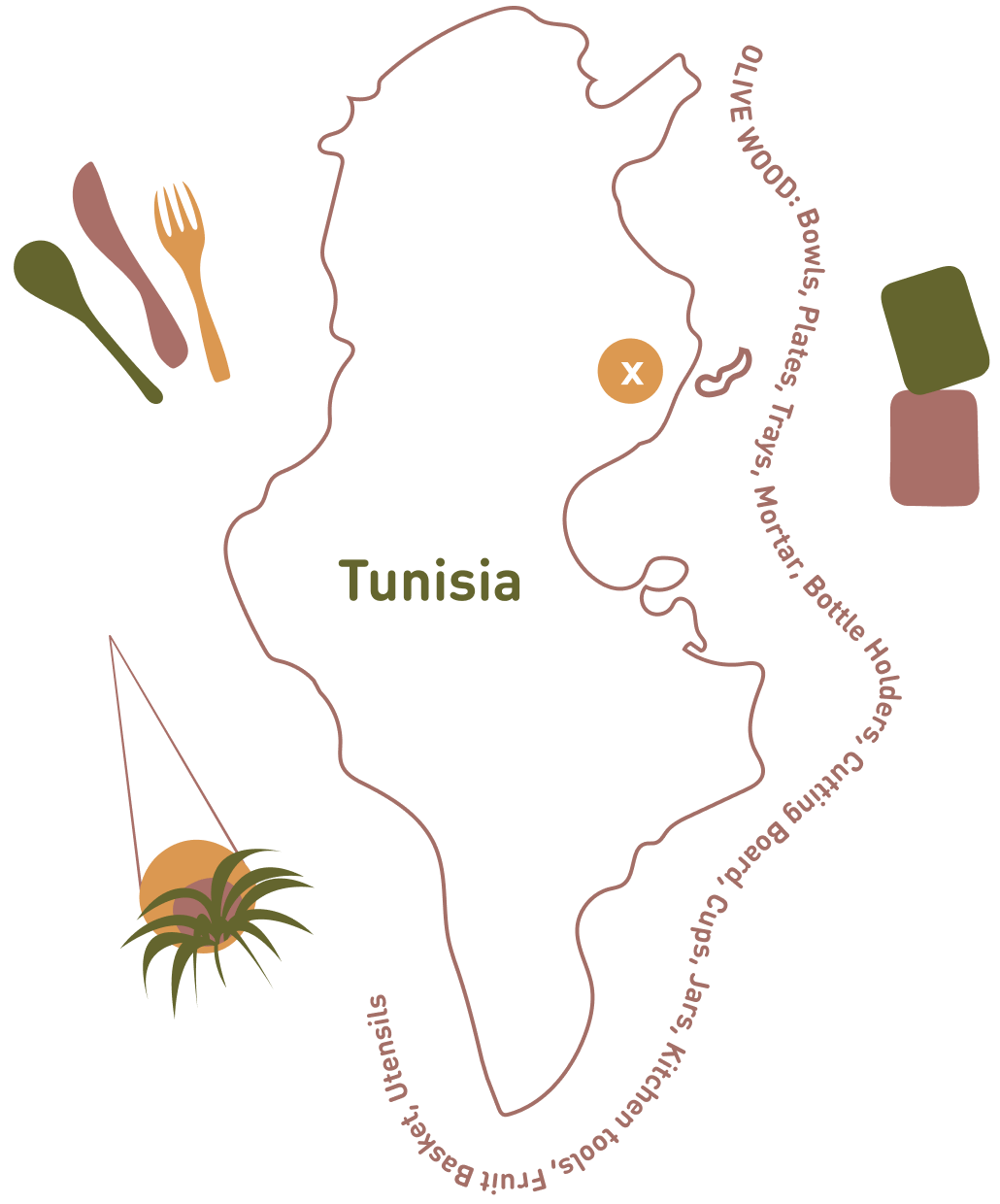
Sfax, Tunisia
Rustic enthusiasts know and love olive wood as it perfectly captures the warm, countryside aesthetic. We source our olive wood from the largest olive tree-producing city of Sfax in Tunisia through a modest, family-run wood shop.
Our master artisans use time-honored techniques that preserve and highlight the complex beauty of olive wood. They are inspired by the cultural and mythological contexts of olive wood, making our pieces one of a kind and full of character.

Olive Wood
How old are olive trees when harvested?
Olive wood plantations in Sfax, Tunisia are highly regulated by the government. Olive trees can only be cut and processed when they no longer bear fruits, which take an average of 500 years. Government permission is also required before select trees can be harvested to ensure cooperatives and companies follow standard protocols.
History and Culture in Your Hands
The artisanal industry in developing regions are important areas of growth. Since it employs a majority of local tribes or grassroots communities, artisanship can effectively create more sustainable livelihoods, provide opportunities for technological advancement, promote cultural heritage, and manage the ethical, equitable, and ecological harvesting of native trees.
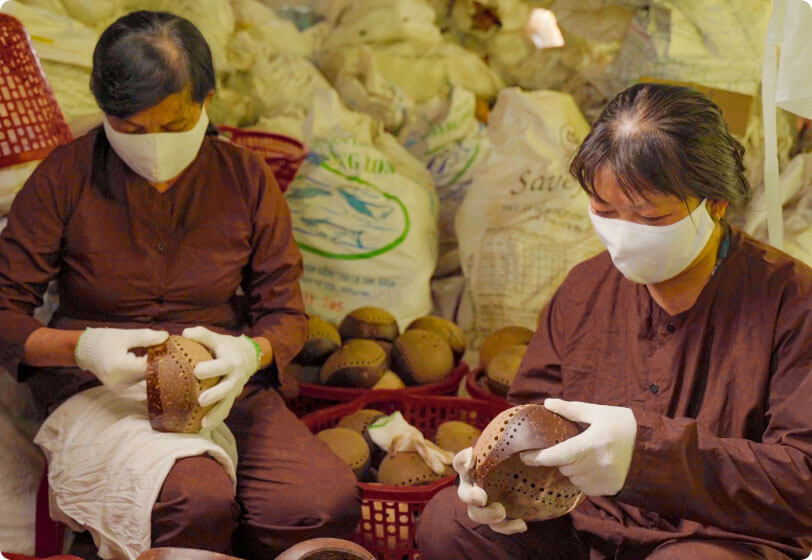
Vietnam
- Vietnam has 2,000+ craft villages composed of ethnic minority groups and urban poor.
- The artisanal and craft industry employs 11 million workers.
- Vietnam’s wood and wooden exports are worth US$10 billion per year.
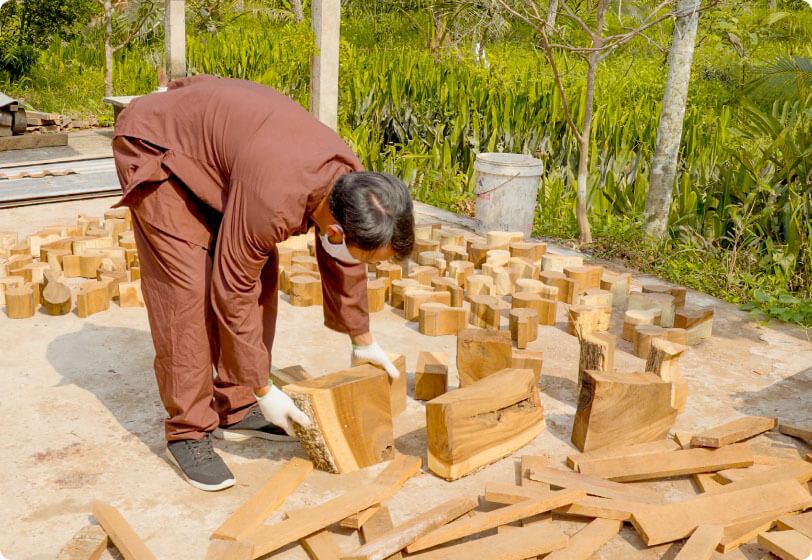
Indonesia
- Wood products account for nearly 75% of Indonesia’s handicraft exports.
- Woodcrafting is a more economically sustainable practice compared to other artisanal practices in Indonesia.
- Teak plantations in Indonesia cover 1.1 million hectares.
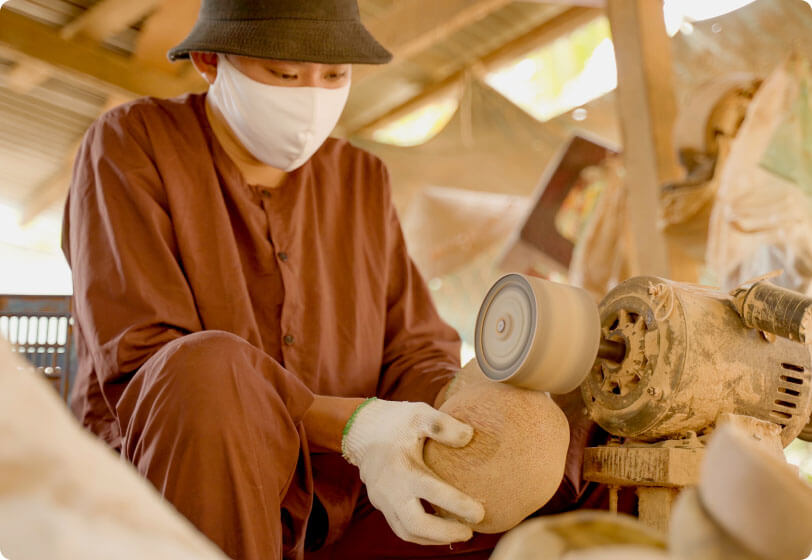
Tunisia
- There are 350,000+ employed artisans in Tunisia.
- The artisanal industry makes up 3.9% of the country’s GDP.
- Sfax has 337,000 hectares of olive trees.
